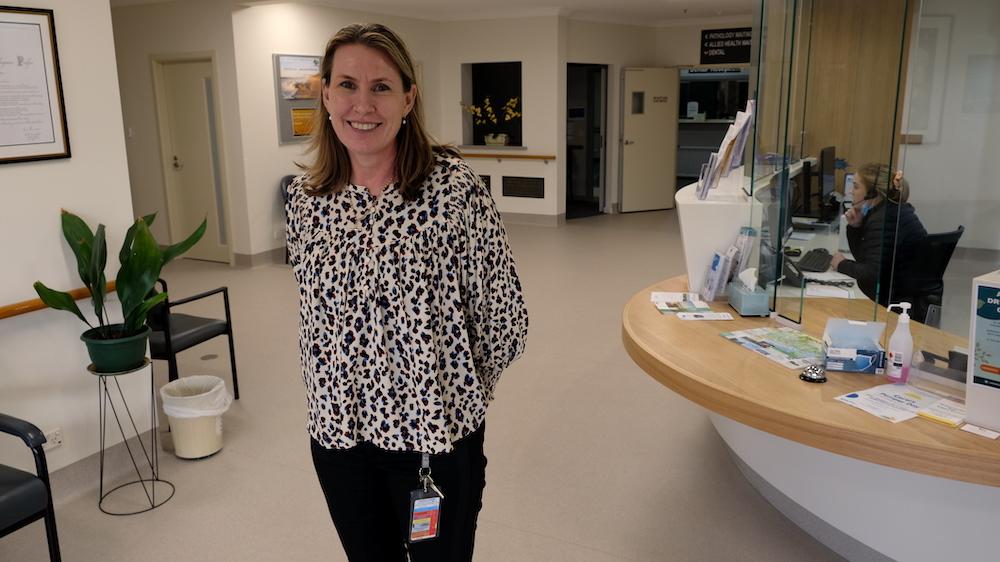
ORH Nurse Unit Manager, Kim Griebenow. Photo: Jake Lynch/ORH
Kim Griebenow is a highly-skilled, passionate, accomplished and ambitious woman, whose whole life has guided her career to be exactly where she is now; in Orbost, making a big difference to the community that raised her.
Orbost was her past, it was her future, it was where she always wanted to be.
Her family tree, too, was sprouted from local soils - generations of dairy farmers on her mother’s side; on her father’s side, timber.
Where young Kim got her ambition to be a nurse, no one knows, but it was there right from the start.
“Maybe it’s just in your nature,” she says.
In the movie of Kim Griebenow’s life, the part near the beginning where she goes off to Melbourne and other places to do her nursing education and placements would be the 30-second montage over music - photos of home, the farm and family pinned to the bulletin board as she studied.
After several years in Melbourne undertaking a nursing degree and then post graduate study, “I always wanted to get back to Orbost,” she says. “That was always the plan.”
In 1998, Jill Vagg, then the Chief Executive Officer at ORH, offered Kim a full-time job on the condition she undertook midwifery postgraduate studies. Kim was ready.
“She said I had to have midwifery. So I quit the job I had at the time in Sale theatres, and went back to do my midwifery study.”
Kim did what she had to do, and made it back to the place she had always wanted to be, the hospital where she and generations of her family members had been born and cared for over the years.
A local guy was a bit of a draw, too, and she married that guy on her return to Orbost as she started out in her nursing career here, 23 years ago.
Back then, Orbost was a different community to what it is today, and so was the hospital.
“It was busier then,” Kim remembered. “We were doing 50 or 60 births a year, some days we would have 3 births in the one day. The theatre was busy and we’d handle more trauma presentations, including car, farm and bush accidents.”
In the years that followed, an aging local population and greater coordination with other health services in East Gippsland brought change to ORH.
“Now we’re much more involved in telehealth medicine, aged care is growing, managing chronic conditions and supporting community care has increased.”
Kim says the changes over the years, including the tumultuous changes since 2020, have only impressed upon her how amazing rural nurses are.
“In smaller health services like ours, every nurse has to be confident and trained to be able to manage whatever comes through the door,” she says. “I’ve been sitting in a managers’ meeting and in an instant had to duck out to support staff to handle a cardiac emergency. Our nurses have to be trained and capable across so many areas. I think our nurses are incredibly flexible, skillful, multi-talented and dynamic.”
Since returning to Orbost, Kim has whole-heartedly embraced the opportunity to study and evolve as a nurse, upskilling in a range of clinical and management areas, including completing a Masters of Health Management (during COVID if you don’t mind).
“I’ve always been a big believer in education,” Kim says. “If I’m able to expand on what I can do, that means hopefully I can continue to make a greater contribution to this health service and this community.”
Education aside, though, when you ask Kim what it is that continues to motivate her to do the work that she does, the answers get a lot more personal, more emotional.
She says that during her time in metropolitan health services she often felt that she was “treating people like a number.”
“Here, you know everyone. That can be difficult at times, but there is something very rewarding about caring for people you know.”
She tells the story of a young man she had known most of her life who had terminal cancer, and was brought to the Orbost hospital when it became clear he was in the last days or weeks of his life.
“The gentleman was in severe pain,” she remembers. “I went and sat with him while his family was on their way and pain relief was being organised. I held his hand and he looked up at me and said “’I’m so glad you’re here Kimmy.’”
“I feel very privileged to be able to influence the experience people are having during these challenging times in their lives.”
Another story she tells illustrates just how committed to their patients our country nurses are.
“I remember an older man, he was from around here, and he was transferred back to Orbost to die after many months in Melbourne hospitals.
“On arrival, when it became clear that he maybe only had a day or so to live, he said to me ‘All I’d like to do is sit on my veranda one last time.’”.
He lived on a small rural property 15kms out of town.
“So, one of the other nurses and I, we looked at each other and thought, ‘well, that’s what we’re going to try and do then.’ Our team rallied together to grant this man his dying wish. After about 6 hours this was arranged and the ambos took the man to his home for a couple of hours."
"On return, this man thanked us all very much and told us he was now ready to die. He died the following day. The patient and his family were forever grateful of our efforts."
Tears come to her eyes as she tells these stories.
“That’s the difference,” she says. “Rural nurses go above and beyond.”